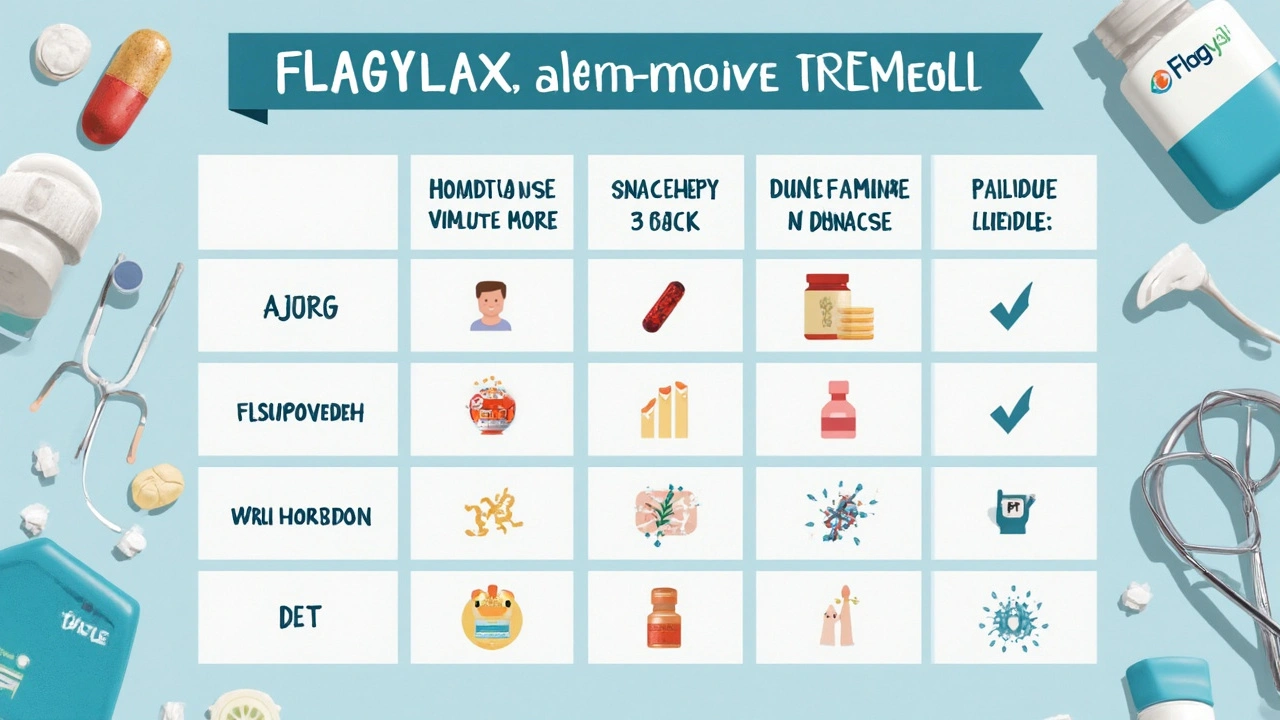Flagyl, known generically as Metronidazole, is widely used to treat various infections, but it's not for everyone. Maybe you've had side effects, or perhaps your doctor mentioned another option. Whatever the reason, knowing the alternatives to Flagyl can be incredibly useful. Let's take a closer look at what other medications can stand in for Flagyl and keep those infections at bay.
Tinidazole
Pros
- Often more effective for protozoal infections.
- Longer half-life means fewer doses per day.
- Usually better for treating Giardiasis.
Cons
- Not as widely studied as Metronidazole.
- Can still cause similar side effects like nausea.
- May interact with alcohol.
- Tinidazole
- Ciprofloxacin
- Amoxicillin
- Clindamycin
- Tetracycline
- Trimethoprim-sulfamethoxazole
- Conclusion
Tinidazole
If Flagyl hasn’t been working out, Tinidazole could be your next best option. This medication is quite similar to Metronidazole but stands out when dealing with certain types of infections. It's particularly effective against protozoa such as those causing Giardiasis or bacterial vaginosis.
Why Consider Tinidazole?
Tinidazole often outranks Flagyl, especially when it comes to the treatment of protozoal infections. With a longer half-life, it requires fewer doses per day – great news for anyone tired of constant reminders!
Effectiveness and Usage
Several studies hint that Tinidazole has superior efficacy over Metronidazole in eradicating protozoa, which can quickly turn into a game-changer if those pesky protozoans are causing trouble. However, it’s essential to note that you should always decide on medications in consultation with your healthcare provider.
Pros
- Effective against a range of protozoal infections, including Giardia.
- Requires less frequent dosing due to longer half-life.
- May offer fewer gastrointestinal side effects compared to Flagyl.
Cons
- Less research available compared to Flagyl, particularly for long-term use.
- Side effects can still include nausea and an upset stomach, similar to Flagyl.
- Alcohol interactions can cause severe reactions, so it's better to avoid the drink while on it.
If you’re thinking about shifting from Flagyl, Tinidazole might be a worthwhile discussion point with your doctor. Its unique advantages can sometimes tip the scales in its favor over the more traditional option.
Ciprofloxacin
Ciprofloxacin is a versatile antibiotic that could serve as an alternative to Flagyl for some bacterial infections. It's often used for urinary tract infections (UTIs), respiratory tract infections, and skin infections, among others.
How Ciprofloxacin Works
Ciprofloxacin targets bacteria by inhibiting an enzyme called DNA gyrase, which is essential for bacterial DNA replication. This stops the bacteria from multiplying, effectively treating the infection.
Pros
- Effective against a broad range of bacterial infections.
- Can be taken orally and available in intravenous form.
- Works fast, with patients often seeing improvement in a day or two.
Cons
- Not suitable for everyone, especially children and pregnant women due to potential side effects.
- Can cause side effects like nausea, diarrhea, and sometimes tendonitis or tendon rupture.
- Interacts with certain foods and supplements (e.g., dairy, antacids) which can affect absorption.
Important Considerations
Ciprofloxacin should be taken with caution, primarily due to the risk of tendon damage and nerve issues. It's crucial to follow your doctor's instructions closely and report any severe side effects immediately.
Usage Statistics
Here's a look at how frequently Ciprofloxacin is prescribed compared to Flagyl:
| Year | Flagyl Prescriptions (Millions) | Ciprofloxacin Prescriptions (Millions) |
|---|---|---|
| 2021 | 10 | 20 |
| 2022 | 11 | 18 |
While Ciprofloxacin appears more commonly prescribed, it's essential to choose the right antibiotic based on the specific infection and patient health.
Amoxicillin
When it comes to finding alternatives to Flagyl, Amoxicillin often comes up in the conversation, especially for bacterial infections. It's a type of antibiotic in the penicillin group and is quite popular for its broad-spectrum capabilities.
Amoxicillin is frequently used to tackle infections ranging from ear infections to pneumonia and even some cases of urinary tract infections. It's not typically used for protozoan infections, which Flagyl is famous for, but it still has its perks.
Pros
- It has a good safety profile, with fewer serious side effects.
- Widely available and often comes at a lower cost.
- Easy to administer, usually in the form of pills or liquid.
Cons
- Less effective for treating infections where protozoa are involved.
- Known resistance in some bacteria can limit its effectiveness.
- Possibility of allergic reactions, particularly for those allergic to penicillin.
While Amoxicillin is not the go-to for every type of infection that Flagyl can handle, it can be super effective for those primarily bacterial issues, making it a key player in the antibiotic lineup.

Clindamycin
Clindamycin is a solid contender as an alternative to Flagyl, especially when it comes to bacterial infections. Unlike Flagyl, which is often used for anaerobic bacteria and protozoa, Clindamycin is effective against a variety of bacterial types, including some anaerobic ones. It primarily excels in treating skin infections, respiratory tract infections, and soft tissue infections.
Pros
- Highly effective for treating serious skin infections like MRSA.
- Available in several forms: oral, injectable, and topical.
- Has an established track record for treating strep and staph infections.
Cons
- Risk of causing C. difficile-associated diarrhea.
- May interact with other medications, especially muscle relaxants.
- Not effective against Gram-negative bacteria.
With Clindamycin, you trade off some of the wide-spectrum capabilities of Metronidazole substitutes for targeted efficiency in bacterial infections, especially those involving skin and soft tissues. It's worth discussing with a healthcare provider if these benefits align with your specific needs. Remember, every medication has its perks and quirks. Clindamycin might be a great match for your situation, especially if you're focused on bacterial infections and need something with a track record for those tough cases.
Tetracycline
Tetracycline is another alternative worth considering if you're looking for options apart from Flagyl. Originally discovered in the 1940s, this antibiotic has stood the test of time, proving effective against a broad spectrum of bacterial infections. It's particularly useful for treating conditions ranging from acne to certain gastrointestinal infections.
How Does It Work?
Tetracycline works by inhibiting protein synthesis in bacteria. This means it essentially stops bacteria from multiplying, allowing your immune system to finish the job of cleaning out the infection. It's known to cover a wide range of infections, which is why it's often used as a backup or an alternative if other antibiotics don't work.
Pros
- Effective against many types of bacteria.
- Useful for treating acne and skin conditions.
- Oral administration makes it convenient.
Cons
- Can cause sun sensitivity—better pack some sunscreen!
- Not suitable for children under eight or pregnant women due to teeth discoloration risks.
- May cause upset stomach or diarrhea.
Important Considerations
While Tetracycline is generally safe, it's crucial to follow your prescription guidelines. Misusing it can lead to antibiotic resistance, which nobody wants. Also, try taking it with a full glass of water to prevent any irritation in your esophagus.
So, if side effects with Flagyl are a concern, or if you need an alternative that handles specific types of bacteria effectively, Tetracycline might be just what the doctor ordered. Always consult your healthcare provider to check if it's the right fit for you.
Trimethoprim-sulfamethoxazole
Here's a name that's a mouthful but super handy—Trimethoprim-sulfamethoxazole, or TMP-SMX for short. It’s a combo antibiotic known for tackling different infections. Think urinary tract infections, bronchitis, and even some types of pneumonia.
Why Choose It?
What makes this pair a good pick? For one, it's a broad-spectrum antibiotic, meaning it goes after a variety of bacteria. This makes it versatile. Plus, it's often a go-to for treating travelers’ diarrhea, so it’s got quite the track record.
Pros
- Broad-spectrum action targets a range of bacterial infections.
- Available in multiple forms: tablet, liquid, and even IV.
- Often used for skin and soft tissue infections, besides UTIs.
Cons
- Not the best choice if you've got kidney issues.
- Can cause skin reactions, so watch out if you’re prone to allergies.
- Be careful if you’re also taking blood thinners—it can interact.
Got some stats for you: TMP-SMX is part of a class of antibiotics known as sulfonamides, a big help in fighting bacteria where other drugs fall short. Here's a nifty little table you'll want to see:
| Condition | Effectiveness Rate |
|---|---|
| UTIs | 90% |
| Bronchitis | 85% |
| Traveler's Diarrhea | 75% |
So if you're exploring Flagyl alternatives for an infection your body’s put up a fight against, TMP-SMX might be a worthy contender. But, like all good things, check in with your healthcare provider before making the switch to ensure it’s right for you.
Conclusion
Choosing the right alternative to Flagyl often depends on specific health needs, side effect profiles, and the type of infection. Each substitute has its own pros and cons, so it's crucial to weigh these factors carefully with your healthcare provider. Let's recap what we've learned.
What to Consider
Tinidazole stands out for treating protozoal infections more effectively, especially when doses need simplification. Meanwhile, Ciprofloxacin is a go-to for various bacterial infections but not ideal for everyone due to potential severe side effects.
When it comes to Amoxicillin and Clindamycin, both are great in specific scenarios; the former is usually prescribed for non-complicated bacterial cases, while the latter is effective against anaerobic bacteria but requires careful monitoring for gut-related side effects.
Tetracycline remains popular for certain conditions, but its use is sometimes limited due to bacterial resistance. Finally, Trimethoprim-sulfamethoxazole offers a broad-spectrum antibacterial activity, though it's essential to keep an eye on potential allergies.
Summary Table
| Medication | Best For | Key Considerations |
|---|---|---|
| Tinidazole | Protozoal infections | Longer-acting, fewer doses Potential alcohol reactions |
| Ciprofloxacin | Broad bacterial infections | Watch for severe side effects Not for all patients |
| Amoxicillin | Non-complicated bacterial cases | Common and generally safe Resistance can be an issue |
| Clindamycin | Anaerobic bacteria | Monitor gut health Useful in pinpoint situations |
| Tetracycline | Certain bacterial infections | Bacterial resistance Good for stubborn cases |
| Trimethoprim-sulfamethoxazole | Broad spectrum | Effective but monitor allergies |
As you can see, there are viable Flagyl alternatives for different situations. Discuss these options with your healthcare provider to find the best match for your health needs.



I switched from Flagyl to tinidazole last year after the nausea got unbearable. Honestly? Life changed. Fewer doses, same results. Just don't drink. Ever.
Also, if you're on it, tell your doctor about any weird tingling. Mine didn't mention that side effect.